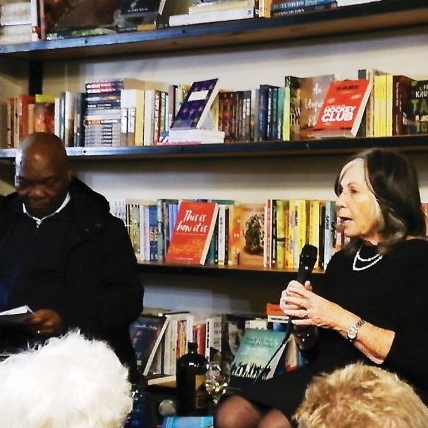News
Memoir makes apartheid activism personal
When both your parents are arrested and held for three months without trial, and you – a young teenager – have to look after your three younger siblings, you are left with much more than a story to tell.

JORDAN MOSHE
This was the shock awakening of Toni Strasburg, the daughter of activists Rusty and Hilda Bernstein, shortly after a state of emergency was declared in South Africa in 1960.
Strasburg has combined the voices of her father and mother with her own to give a face to the traumatic history of apartheid South Africa. In her book, Holding the Fort: A Family Torn Apart, she makes the experience of living under a brutal regime personal.
It is a memoir of the author’s experiences in South Africa in the 1960s, pieced together from her own memories and the writings and diary entries of her late parents.
Strasburg was in Johannesburg to launch her memoir at Love Books in Melville on Tuesday.
She told the SA Jewish Report that the book’s creation began with her mother’s death in 2006.
“My sister and I came across reams of my mom’s diaries after she died, most of which I don’t even want to look at,” she says. “The three months which the book cover was a short period in her life. I read through them, and found it was a time I remembered.”
Strasburg says the diary entries, many of which were penned during her mother’s incarceration, made it clear that she remembered less than she thought she did. Supplementing her memories with the text, she integrated the diaries into her own narrative, adding her father’s writing at the last minute for a man’s voice.
It posed considerable challenges. “Getting my writing to flow alongside my mother’s writing – which I really wanted to showcase – was a challenge,” Strasburg says. “I really wanted to do it for her, because she deserves to have her personal experiences shared.”
Her mother’s experiences have helped Strasburg to better understand her own past. As Strasburg was sixteen at the time, there was much she couldn’t comprehend. “There were things I didn’t fully understand,” she says. “I had no conception of what a hunger strike was. To a sixteen-year old who has never gone without lunch, ten days without food is difficult to understand.
“This is really the distant past, and it feels almost like somebody else’s story. There were events after that which were much more traumatic. The Rivonia Trial and going into exile were both much bigger events. This was just a short time in our lives.”
For this reason, Strasburg believes her book is readable and different. “This is the story of three months in the lives of people during the state of emergency, in particular that of a group of white women in prison about whom my mother writes,” she says.
“It’s an easily accessible book, and not a big story. I’m not trying to speak about the revolution or suggest that I’m a hero of the struggle. There are enough of those, which is why I have pitched this differently. The inclusion of other voices, writings, and drawings adds to the appeal.”
While the book’s creation gave her satisfaction, it was not an exercise in psychological catharsis. “We dealt with what happened a long time ago,” she says. “There was a time for that to be dealt with, and that has passed.”
What she has gained from the exercise, however, is an understanding that the voices of others can be used to give expression to your own voice. “It’s possible to use another’s material in a personal way,” she says. “I have used my mom’s own writing to express myself. It’s quite hard to take another’s writing and make it your own.”
The inclusion of her mother’s writing adds a personal dimension to a political history. “We often come across the idea that political people were not effective parents,” Strasburg says. “But my mother’s letters show her concern as a parent, and her love for her children.”
“This was an ordinary family. Obviously my family wasn’t ordinary, but at the same time, we were. We had a house in Observatory with a pool, we went on holiday, we attended school – all part of a normal, white life. It wasn’t all drama.”
This duality is ultimately the message her book imparts best. “The message is that you need to stand up to inequality, but support your family at the same time,” says Strasburg. “ You can’t keep your mouth shut in the face of discrimination, but family always matters as well.”